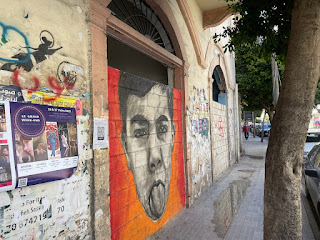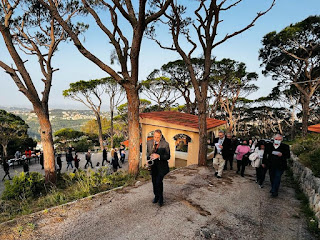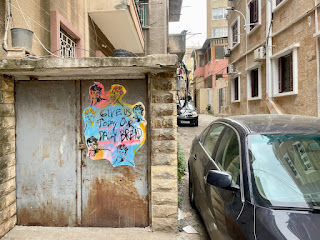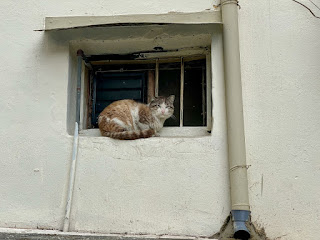49.The Same Playbook (30 April 2022)

Facing the electric company and registering
his opinion with no ambiguity
(28 March 2022 - Gemmayzeh, Beirut)
One of the
most distressing feelings one might have is when it seems like someone, near or
far to your heart, has obtained a copy of the script of your life and is
reenacting the worst scenes in it, sometimes with only slight variations. There
is nothing you can do to affect the outcome except to watch helplessly (or avert
your eyes) and hope for the best. You know the story line, because you went
through it once – or perhaps copied from someone else’s playbook before you,
and at that time you didn’t listen to anyone’s advice to take a different
direction. The saying in Armenian (and other languages) is true: a person
learns from his own purse. Rare is the one who learns from another’s hard
lessons.
It seems that this is also true on a
larger scale, with entities such as organizations and even entire nations
following a preset script. The Armenian nation presents an interesting example
of this, as it takes up its old playbook and reenacts the worst days of its own
history. In general, its behavior is fueled by a strange bit of amnesia as to the
reasons for it suffering what it did in the past, combined with an inability or
unwillingness to chart a different course for the future. The country of Armenia,
ever at the mercy of greater powers, is struggling to continue its existence,
while it suffers setback after setback following its disastrous defeat in 2020.
The Armenian people, part of the larger entity called “the nation”, are sometimes
filled with concern over what is happening, and sometimes are profoundly
disinterested over what seems (to them) will not really affect them. An
acquaintance from Armenia recently said that these days are probably more dangerous
than the post-Genocide days. I concur, because the post-Genocide generation
knew that they needed to forge an identity and pursue that in all aspects of
their life; we of today’s generation are so fragmented and individualistic that
we cannot be bothered to see where our indifference and disunity will lead us.
The children showing the people how to
worship (10 April 2022 - Geitawi, Beirut)
I had the good fortune of never
having been a serious participant in any sports activity. Always one of the
last to be chosen when picking teams in or out of school, I early on put aside
any delusion that I possessed sports-related skills. I focused on the arts and
music (but not on studying). But, whether you use the playbook or the script
image, this is a helpful way to view today’s disastrous world, and to see
important connections between seemingly disparate events. The “who-cares-we’re-a-failed-state”
playbook had been in use by local leaders long before the economy crashed,
though it was never publicized. It is still the primary one driving current
events and directing local actors to perform well for their masters. The population
has picked up the well-worn copy of the “vote-for-your-party-not your-country”
as it nears parliamentary elections in May, following which those elected will
be using the “it’s-their-fault” playbook when daily life fails to improve.
Those outside Lebanon use the “benevolent-state” playbook, announcing their full
support for local reforms while maintaining policies that undermine any possibility
of improvement in any area. 
Easter morning, the pied piper of... KCHAG?
(17 April 2022 - Monteverde)
During the current European war the “bomb-into-submission”
and “everyone-is-our-enemy” playbook is the one in use, connecting today’s aggressors
to the aggressors in the Artsakh war of 2020, and so many other wars, including
the Ottomans’ war against its Armenian citizens a century ago. The “territorial-integrity”
playbook is in heavy use in Ukraine, just as it was by Azerbaijan (and by the sympathetic
but impotent friends of Armenia) when Artsakh was being attacked. The “black-and-white”
playbook is opened frequently in the West (and for the West), in order to
explain the intricacies of wars and security actions to those with limited interest
or ability to discern grayscale shades. And the “your-oil-is-more-important-than-you”
playbook is probably the only one shared by every single major power, no matter
in which direction their guns are pointed or shipped. The “ideological-high-ground”
playbook is also frequently read from, though the actors never take the stage.
It is a grand drama and a high-stakes game that we are witnessing, based on a
series of playbooks that will make the world the same as it has ever been, or
ever will be.
An "illegal" green space developing on the
grounds of the former Laziza brewery.
Greenery appears to be illegal in Beirut
(28 April 2022 - Geitawi, Beirut)
Fortunately – and I say this
sincerely – there are weak and unimportant people in the world. These are the
ones who I consider to be able to make real and lasting change. They are the
ones who interface with their neighbors each day and look into their eyes with perception
and compassion. This is not to praise interpersonal relations in general. The
other day a small shopkeeper spoke of how some homemade food distributors in Lebanese
villages easily take advantage of people like her by following the fluctuations
in local currency against the dollar, then collecting payment well above the day’s
street value, saying, “If you don’t want to pay, then I’ll find someone else to
sell to.” Despite my insistence that I pay the current value of my purchase,
she refused to take more from me than the outdated prices listed on her shelves.
Naming the evil that allows
disasters, destroying people and
their heritage (30 April 2022 -
Mar Nicola, Beirut)
My guess is that the difference lies
in whether people have an actual, human relationship with each other, and not a
transactional one. It’s the same with the church. Do I share a gospel message with
someone because it’s expected of me, because it’s a requirement, because I
consider my religion superior and his inferior or completely wrong? Or do I
truly care for the other person as someone created in God’s image, whom God
loves as much as he loves me? That person-to-person playbook is the one that
brings true hope and opens hearts to receive the actual good news. It may be
crass to characterize Jesus’ ministry in this way, but the gospel is so full of
these kinds of interpersonal “detours” that Jesus took as he shared the gospel
of God’s kingdom and the promised new life in that kingdom, that it must be an
integral part of the message. My conclusion is that God has put his playbook into
our hands and sent us from the church to the world. One who plays according to
this script stands little chance of preventing the “rulers of this age” to
seize the day; but in God’s timing, living this way will undermine every earthly
power.
God hears, but do we?
(8 April 2022 - Mar Mikhael, Beirut)
 |
| LebCat 49: Go find your own ledge! (24 March 2022 - Geitawi, Beirut) |
Once upon a time in Lebanon, when paying for groceries, if there were a few piastres (or liras) left to round up the total, the cashier would toss a pack of 2 pieces of chewing gum into your order. In recent years it became the whole box of gum, and then progressed to a sachet of instant coffee. Today as I was buying fruit from my friendly fruit-cart pusher, “Abou Mawz”, he announced 8,000 lira for a half-kilo of bananas. Then he winked and said he would make it 10,000, as I nodded and he tossed another banana on the scale. Imagine… fruit as small change. But that’s the playbook regular Lebanese people have long used. And it’s the playbook that even those most desperate to leave the country will be searching for, and not finding, in their newly-adopted homelands. [LNB]